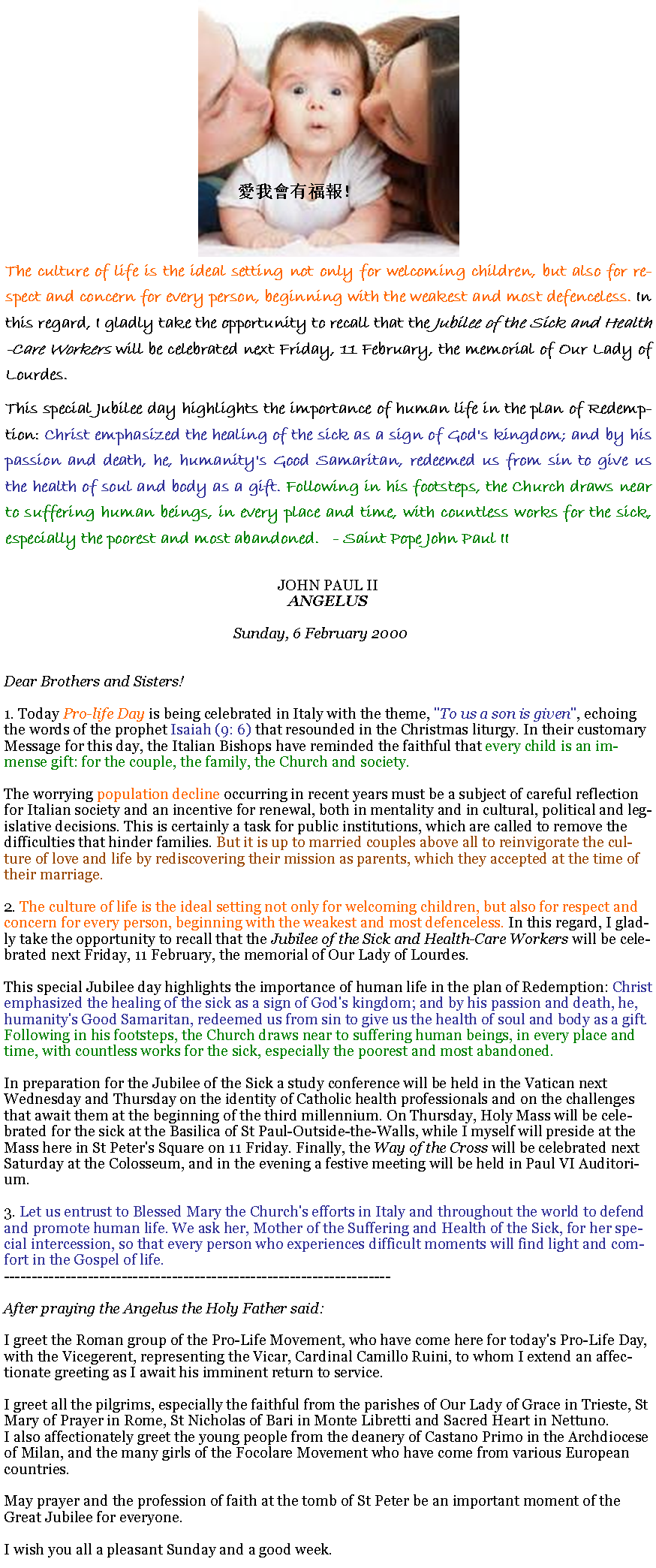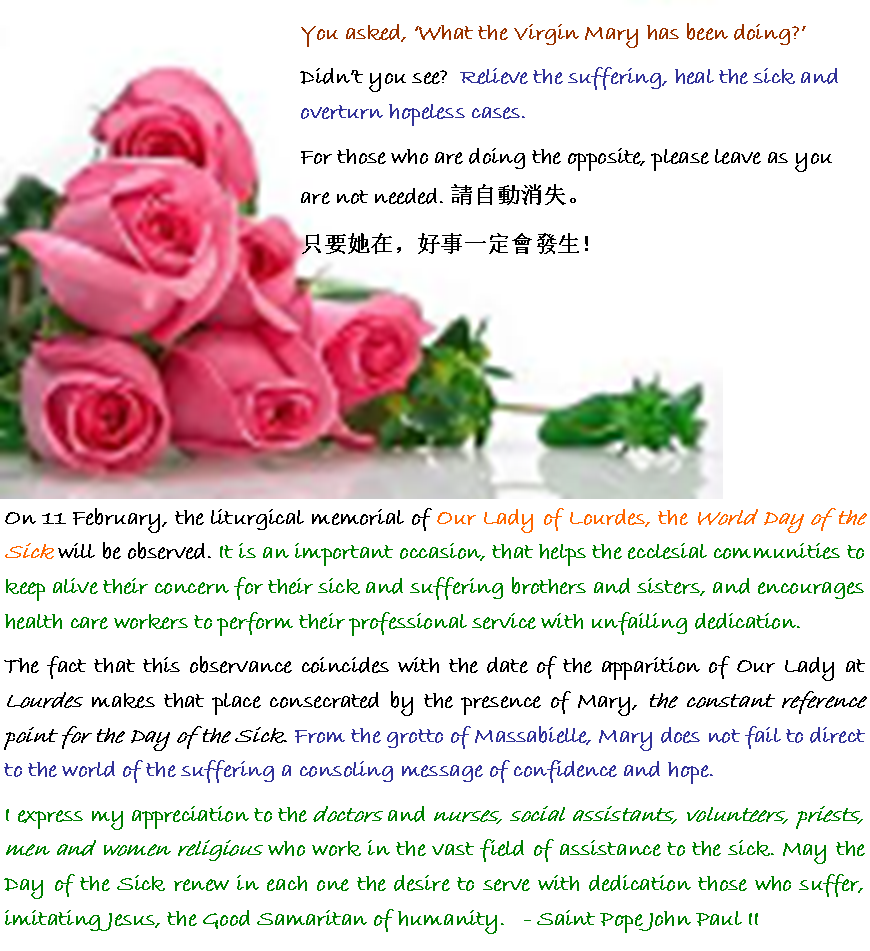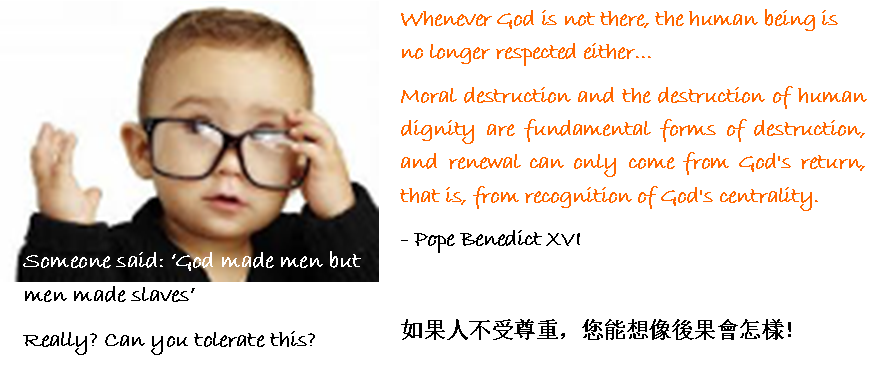|
148 |

|
Poor Job, if only he knew what good luck was awaiting him, he would not be so depressed. See the Story of Job in Encouragements- 148 & 149. You may also want to read the Story of Tobit in Encouragements- 48 & 49, The aforesaid passages are Good News to all who are suffering in this Economic Crisis which started around 2008. It seems that the revival of the Global economy is still pretty slow despite all the hard work of the Rulers and Economists. It was reported in the News that some European Bonds yields are still negative and Gold prices are record low now (12 March 2015) jacking up the US$. But please remain optimistic and trust that God will always bless the good; just as what He had done for Job and Tobit. Hello, please remain joyful and you must live long enough in good health to see what good luck He is going to shower upon you! |

|
Fifth Sunday in Ordinary Time, Gospel Reading: Extracted from the holy Gospel according to Saint Mark 1:29-39 On leaving the synagogue, Jesus went with James and John straight to the house of Simon and Andrew. Now Simon’s mother-in-law had gone to bed with fever, and they told him about her straightaway. He went to her, took her by the hand and helped her up. And the fever left her and she began to wait on them. That evening, after sunset, they brought to him all who were sick and those who were possessed by devils. The whole town came crowding round the door, and he cured many who were suffering from diseases of one kind or another; he also cast out many devils, but he would not allow them to speak, because they knew who he was. In the morning, long before dawn, he got up and left the house, and went off to a lonely place and prayed there. Simon and his companions set out in search of him, and when they found him they said, ‘Everybody is looking for you.’ He answered, ‘Let us go elsewhere, to the neighbouring country towns, so that I can preach there too, because that is why I came.’ And he went all through Galilee, preaching in their synagogues and casting out devils.
Sharing: It was the 5th Sunday in Ordinary Time on 8 February 2015.
The Readings that were read in the Eucharistic Celebrations all over the world on the same day are shown in the above:
1st Reading: Job 7:1-4, 6-7, Responsorial: Psalm 147:1-6, 2nd Reading:1 Corinthians 9:16-19,22-23 & Gospel Reading: Mark 1:29-39.
We have extracted the Homilies Pope Benedict XVI & Pope Francis I based on the aforesaid Readings to share with you, so that you could similarly be encouraged: |

|
This is what He will say to the good: “Come, you whom my Father has blessed, take as your heritage the kingdom prepared for you since the foundation of the world. For I was hungry and you gave me food, I was thirsty and you gave me drink, I was a stranger and you made me welcome, lacking clothes and you clothed me, sick and you visited me, in prison and you came to see me.” “...In truth I tell you, in so far as you did this to one of the least of these brothers of mine, you did it to me." (Matthew 25:34-36,40) 8-) See for yourself what will happen to those who do the opposite >Encouragements-78. ————————————————————————————–———————————————————————————— By healing the sick, Jesus shows that his gift of salvation is offered to the whole person, since he is the physician of soul and body. His compassion for those who are suffering spurs him to identify with them, as we read in the passage on the last judgement: “I was sick and you visited me” (Matthew 25:36). It is this deep sharing that he asks of his disciples, when he entrusts them with the task of “healing the sick” (cf. Matthew 10:8). If we pray with faith, the Lord will not fail to work miracles of healing even today. His Providence, however, usually works through our responsible efforts and requires us to combat illness with all the resources of intellect, science and appropriate medical and social assistance. Jesus’ love for the sick encourages us especially to put the resources of our heart into action. We know from experience that, when we are ill, we not only need adequate treatment, but human warmth. Unfortunately in contemporary society we often risk losing genuine contact with others. The pace of work, stress or family crisis makes it increasingly difficult for us to give one another fraternal support. It is the weakest who pay the price. Thus it can happen that the elderly who are no longer self-sufficient, defenceless children, the disabled, the severely handicapped and the terminally ill are sometimes seen as a burden and even an obstacle to be removed. On the other hand, walking at their side, dear brothers and sisters, helps build a society with a human face, enlivened by a deep sense of solidarity, where there is room and respect for all, especially the weakest. - Saint Pope John Paul II |
|
JOHN PAUL II ANGELUS Sunday, 9 February 1997
Dear Brothers and Sisters,
1. The Gospel often speaks of the cures worked by Jesus. The sick crowded round him and sought to touch him “for power came forth from him and healed them all” (Luke 6:19). I like to remember this shortly before the fifth World Day of the Sick, which will be celebrated this coming 11 February, the feast of Our Lady of Lourdes.
By healing the sick, Jesus shows that his gift of salvation is offered to the whole person, since he is the physician of soul and body. His compassion for those who are suffering spurs him to identify with them, as we read in the passage on the last judgement: “I was sick and you visited me” (Matthew 25:36). It is this deep sharing that he asks of his disciples, when he entrusts them with the task of “healing the sick” (cf. Matthew 10:8).
If we pray with faith, the Lord will not fail to work miracles of healing even today. His Providence, however, usually works through our responsible efforts and requires us to combat illness with all the resources of intellect, science and appropriate medical and social assistance.
2. Jesus’ love for the sick encourages us especially to put the resources of our heart into action. We know from experience that, when we are ill, we not only need adequate treatment, but human warmth. Unfortunately in contemporary society we often risk losing genuine contact with others. The pace of work, stress or family crisis makes it increasingly difficult for us to give one another fraternal support. It is the weakest who pay the price. Thus it can happen that the elderly who are no longer self-sufficient, defenceless children, the disabled, the severely handicapped and the terminally ill are sometimes seen as a burden and even an obstacle to be removed. On the other hand, walking at their side, dear brothers and sisters, helps build a society with a human face, enlivened by a deep sense of solidarity, where there is room and respect for all, especially the weakest.
3. Looking to Christ, physician of souls and bodies, we also meet the caring gaze of Mary, invoked by Christians as “Health of the sick”, Salus infirmorum. May the Blessed Virgin help us touch the healing hand of her divine Son, welcome the saving power of the Gospel and become ourselves a concrete witness to all who need us. -------------------------------------------------------------------------
After greeting the pilgrims in various languages, the Holy Father added extemporaneously:
I wish you all a pleasant Sunday and good week, in which we will already begin Lent. The liturgy of ashes will be celebrated on Wednesday. Praised be Jesus Christ! |


|
JOHN PAUL II ANGELUS Sunday, 9 February 2003
Dear Brothers and Sisters,
1. On 11 February, the liturgical memorial of Our Lady of Lourdes, the World Day of the Sick will be observed. It is an important occasion, that helps the ecclesial communities to keep alive their concern for their sick and suffering brothers and sisters, and encourages health care workers to perform their professional service with unfailing dedication.
The fact that this observance coincides with the date of the apparition of Our Lady at Lourdes makes that place consecrated by the presence of Mary, the constant reference point for the Day of the Sick. From the grotto of Massabielle, Mary does not fail to direct to the world of the suffering a consoling message of confidence and hope.
2. As is well known, the main celebrations of the Day will take place in the majestic National Shrine of the Immaculate Conception in Washington, capital of the United States of America. I express heartfelt gratitude to those who have organized the different events of this important ecclesial realization.
I express my appreciation to the doctors and nurses, social assistants, volunteers, priests, men and women religious who work in the vast field of assistance to the sick. May the Day of the Sick renew in each one the desire to serve with dedication those who suffer, imitating Jesus, the Good Samaritan of humanity.
3. At this time of international concern, we all feel the need to turn to the Lord to implore the great gift of peace. As I pointed out in the Apostolic Letter, On the Most Holy Rosary, "the grave challenges confronting the world at the start of this new millennium lead us to think that only an intervention from on high ... can give reason to hope for a brighter future" (n. 40). Many prayer initiatives are taking place these days all over the world. While I endorse them wholeheartedly, I invite all to take up the Rosary to ask the intercession of the Blessed Virgin Mary: "One cannot recite the Rosary without feeling caught up in a clear commitment to advancing peace" (same place, n. 6). |

